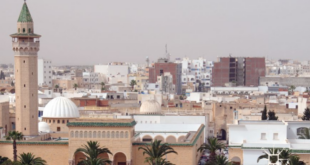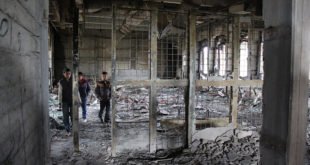Middle East Custom Coverage is a unique service offered by APTN to its Middle East clients. TBS Senior Editor S. Abdallah Schleifer spoke with APTN Senior Editor Hany El Konayyesi about MECC and how it provides the region's broadcasters with global coverage, as well as a pool of new talent.
S. Abdallah Schleifer: APTN offers a unique service to your clients in the Middle East—unique not only because nobody else is doing it, but also unique in that you don't offer this to any other region. Could you elaborate?
Hany El Konayyesi: It is formally known as Middle East Custom Coverage (MECC), which is a customized service that we provide to most Middle East TV services, especially the major ones such as Egypt TV and Nile News, Saudi Television, Kuwaiti TV, Oman TV, Al-Jazeera, the Dubai Satellite Channel and the Dubai Business Channel, and most recently Tunis TV. We started coverage for ANN, and they are coming back to us. MBC was an early client and theoretically still is, although right now they are restructuring for their move to Dubai. We provide a fully produced news report or news package—that means ready to air, fully edited and voiced with on-camera closer and a suggested intro. The signoff is in the name of the channel we are servicing. Each channel gets a different reporter so if all of our clients want to cover the same story, which in stories like Jerusalem is a daily phenomenon, then each gets a different report done by a different on-camera correspondent from our Jerusalem bureau.
Some of these correspondents work as retained freelancers and some work on a strictly freelance basis and in the case where we have a guarantee we will assign or hire a full-time staff correspondent to service the client. Basically the operation relies on a full-time producer in every major bureau servicing MECC.
Schleifer: Why does this service exist exclusively for APTN's clients in the Middle East?
El Konayyesi: Partly that's because TV news culture is quite new to the Arab countries. Seven or eight years ago you would hardly see a field report done according to international standards, with a script, soundbites, the story edited to a script. But the Arab channels had the ambition and the money to get this sort of coverage, particularly starting from the time when MBC took a major share of the viewing market because they provided, for the first time in Arabic, this sort of reporting. That competitive driving force was furthered by the brief life of the BBC Arabic TV service and then by Al-Jazeera.
Schleifer: Is there a standard formula for providing service, or does each channel have a different deal?

Schleifer: So if you know of a anti-Iraqi event which wouldn't merit coverage as a global story for APTN, would you still cover it for Kuwait?
El Konayyesi: Yes, because in this service we are not representing APTN and its news values, which is the case with our global news coverage, which take and use as they want but they don't dictate the terms. But in this service, which is customized, we are serving in each case the particular channel and its values. It's a client-driven service, so we must be responsive to client concerns. It isn't a global service, and the reporters, while paid and directed by APTN, do not attribute their reports to APTN; they are surrogate correspondents for Saudi TV, Kuwaiti TV, and our other clients.
Schleifer: Who determines what gets covered for a particular client?
El Konayyesi: It goes both ways. We as MECC offer on a daily basis the main events around the world, not only as hard news but also features. After the restructuring of this department a few months ago, we have a forward planning editor who is in charge of providing clients with lists of scheduled or potential events, and the client can chose what he wants. That's one side. The other side is when the client asks us to cover a specific event that isn't on our general coverage list—for example, when a Saudi or Kuwaiti sheikh is visiting London, the United States, or even Cuba.
Schleifer: What about when Saudi or Kuwaiti VIPs travel in the Arab world?
El Konayyesi: No, then they take it from national TV channels via Arabsat—which means that, ironically, the least professional coverage they get for their VIPs is when they travel in the Arab world. The exception is when they go to independent production houses like Video Cairo. But even in the case of the Arab world, we do provide some of our clients, such as Dubai and Tunis and Saudi Arabia, with coverage from Cairo, Amman, Beirut, or Jerusalem. If it's a super VIP, the Saudis will send their own crew and correspondent.
Schleifer: Another aspect of each deal being separate is the financial aspect. How do you charge for this service?
El Konayyesi: It all depends on the contracts, and they differ. Price also varies because of uplink charges. A story from Sarajevo or Islamabad will cost double what a feed from Paris via London would. In Cairo the price is lower, not because of telecom but because we've had an uplink deal with Video Cairo for the past year. Most of the reports are edited from here using a script, soundbites, and piece to camera fed from the location. This is more economical, not only because it means less overseas staffing—particularly when we are servicing a lot of clients from the same location and story-but also because we have better edit facilities and other facilities like a huge archive library, graphics unit, plus high standard producers. On a slow day, we are doing thirteen stories from seven different locations. Most of the clients contract for some sort of minimum guaranteed coverage.
Schleifer: By providing a "quick fix," does MECC inhibit the Arab channels from developing their own talent that can meet international standards?
El Konayyesi: No, because MECC is also a training ground. For instance Al-Jazeera was almost totally dependent upon APTV facilities for their first two years—that includes nearly all of their foreign correspondents. Now they have their own bureaus all over the world; they still take our service but nowhere near as extensively as before. MBC went the other way; they set up bureaus first—in fact I worked for MBC out of Cairo for a year in 1993 before going to London for BBC Arabic TV—and then two or three years ago, given financial problems and their own downgrading of news and public affairs coverage, they started using APTN facilities and reducing or cutting out marginal bureaus. And in another sense, many of the most famous Arab TV correspondents got their start here at MECC. Al-Jazeera correspondent Yosri Fouda, who had already been on air for the BBC Arabic service, got his start with Al-Jazeera serving them as an APTN Mecca correspondent. There's also Ahmed Kamel, Al-Jazeera's correspondent in Brussels, and Jamal Ismail in Islamabad, who moved from APTN to Al-Jazeera and now to Abu Dhabi.
And finally, we provide training sessions for correspondents, producers, and satellite coordinators for MECC clients, and we introduced the new Electronic News Production System (ENPS). This is a system we use for our production—it's a computerized newsroom integrating every aspect from sourcing news, editing stories, and using library and availability of scripts for rapid editing. Kuwait TV sent two delegations of four people each from the KTV newsroom who were trained here on the system.
Schleifer: Has the service been expanding?
El Konayyesi: The big move happened when APTV and WTN merged. Each of them had their own clients in customized coverage. So suddenly there was APTN with double the number of clients. Ever since we have been very keen on developing the service and getting more clients.
Everybody expected that sooner or later Arab TV services would become self-reliant, phasing out or at least significantly reducing the need for MECC. But it has been proven that even if they have the talent, it is more cost effective for them to use our services than to staff their own bureaus, particularly given the sort of salaries paid to locals in Saudi and the Gulf if they were to be sent abroad. So it's happening the other way around. More Arab TV services are realizing they need the MECC service. But the Arab news editors at the national and satellite channels are more mature, more professional than just four or five years ago. And that makes our job more difficult than ever, because they know what can be done and where, and what's going on, and they want service. In other words they are still with us, perhaps more so than ever before, but they are more demanding.
 Arab Media & Society The Arab Media Hub
Arab Media & Society The Arab Media Hub




